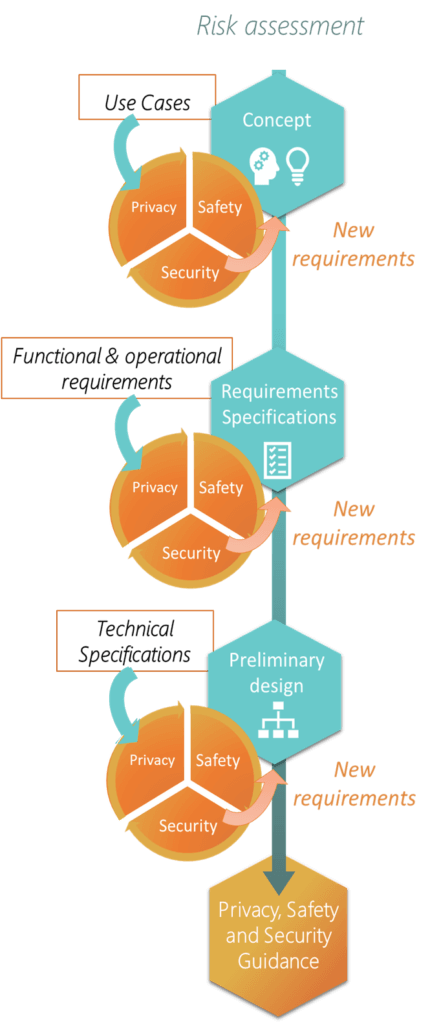The novelty of risk assessment in E-LAND
By Coralie Esnoul and Ioana-Emilia Badea 6. December 2021
A central pillar of the E-LAND project’s is risk management. The Norwegian consortium member, Institute for Energy Technology (IFE), implemented a risk management approach to fit the particular needs of the project, the product, and the members of the E-LAND project. The approach takes into consideration the different stakeholders and partners concerns and their business needs. In this approach, potential risks for the future users of the solution, the Pilot sites, are also addressed.
With the new functionalities of the toolbox arise new risks. The E-LAND solution can challenge the users in the evaluation of the risk for their existing systems, for example as transitioning to non-local data management or change in their business decisions, where their roles and their responsibility regarding their own infrastructure data are changed. As the gap to assess the new risks can be big for the users, it is important to emphasize the risk understanding through clear methodology and communication.
IFE has developed a risk approach based on the best practices on risk assessment, to ensure that the E-LAND concept and product are sufficiently reliable for the stakeholder to introduce it to their existing installation. A detailed paper on the methodology followed has been published (Gao and al, ESREL 2020, https://www.rpsonline.com.sg/proceedings/esrel2020/pdf/5072.pdf) with an analysis that identified risks with a top-down approach, based on different use cases, designed for each pilot site (E-LAND D4.7).
based on different use cases, designed for each pilot site (E-LAND D4.7).
The figure (on the right) shows the Risk assessment flow where risks are addressed at each step of the solution development: at the beginning with the definition of the use case, later in the project where the functionalities of the products and technical specifications are developed. The risk assessment is a continuous process that needs to be repeated periodically.
But is assessing the risk sufficient for the pilot sites to address their risks?
The novelty of the risk assessment in E-LAND
Competencies, technical backgrounds, cultures, the focus of the partners and pilot sites are various among the stakeholders and they can experience difficulties in taking over the risk ownership. To help the partner in this task, IFE has put in place a dedicated risk awareness process where the templates were developed for the project, where risks were explained in a one-to-one meeting with a dedicated focus on the partner risks. These meetings help to clarify the status of mitigations from the risk register with different design partners (ICOM, UdG, RLI, SE). This process has improved the risk understanding and has improved risk collection. From the risk manager point of view, this process has built trust and improved the risk understanding among the partners.
Visual Tools for the pilots
To support risk awareness and improve communication, flyers have been created. This format is easily accessible, short, precise, and constitutes an illustrative way to present an overview of the process and all the topics that have been undertaken. The combination of figures and text provides a redundant way of presenting the information, in order to avoid erroneous interpretations and reduces the risks by increasing risk awareness and the ability to be more self-sufficient in handling risks.
- Check out the risk sheets HERE.
Next Steps
According to direct feedback from the partners, the risk understanding has been improved through regular meetings and dedicated risks communication. Now the risk management continues monitoring the Pilot sites and the future users of the E-LAND toolbox by improving the risk toolkit in integrating a Security and Privacy requirements notice.
Social media
E-LAND updates

The E-LAND project aims to develop and demonstrate tools for energy systems to overcome the technical, business, and societal challenges associated with the creation of… (1 year ago)

E-LAND exploitation enhancement activities kickstarted for the final project year Multiple events were executed and many more are planned for the E-LAND project’s final year.… (2 years ago)

A central pillar of the E-LAND project's is risk management. The Norwegian consortium member, Institute for Energy Technology (IFE), implemented a risk management approach to… (2 years ago)

E-LAND H2020 is working with creating a toolbox that is designed to optimize and control multi-energy islands and isolated communities. The toolbox is structured in… (2 years ago)

Smart Innovation Norway together with the University of St. Gallen have developed a series of workshops that began in June 2021 and focused on the… (2 years ago)

About the pilot site: Port of Borg is situated in an industrial area on a small peninsula called Øra just outside Fredrikstad, Norway. Port work… (2 years ago)

Since the mid-1960s, the township of Auroville in Southern India has been striving for sustainable living and the realization of human unity in diversity. In… (2 years ago)